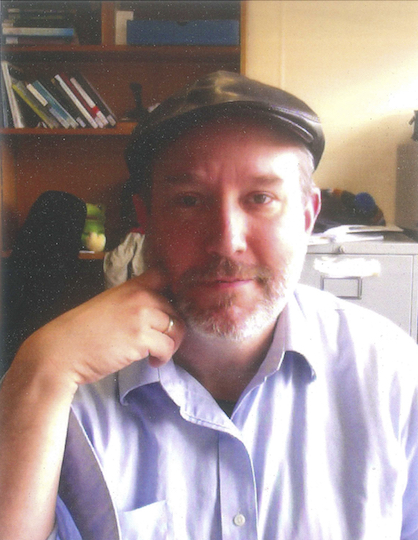MA (Mississippi) PhD (Hawai'i at Mānoa)
Emailhunter.hatfield@otago.ac.nz
Tel+64 3 479 9087
Office 1N10
1st Floor
Arts Building
Albany Street
Dunedin
Mail English and Linguistics
University of Otago
PO Box 56
Dunedin 9054
New Zealand
Teaching
- LING 111 A World of Languages
- LING 240 Language, Brain and Being Human
- LING 318 Child Language
- LING 342 Laboratory Phonology
- LING 415 Psycholinguistics
- LING 423 Special Topic: Language Processing
Hunter reflects frequently on his teaching, always trying to understand how he, his professional expertise, and formal education generally can help students flourish in their future lives. With this in mind, he was a member of Division of Humanities' Rethinking the BA and Core Paper working parties. In what he considers his greatest professional achievement, he was awarded the Overall Top Teacher Award for the university by OUSA in 2015.
Hunter is also the creator of the University for Your Life programme. UniForYou is a place for students to reflect on what they want out of life so they can make choices about how to spend their time at Otago. It is open to students from across the university and has operated in Semester 2 in 2016 and 2017. If you are an Otago staff member and would like to learn more, please contact Hunter.
Beyond teaching and research, Hunter publishes his own reflections on language, economics, systems in general, and higher education at his blog, A Mind on Display. The blog hosts more serious thoughts than a Facebook post or personal blog, but less serious than an academic publication. The blog is written in the spirit of exchanging ideas and modeling curiosity. Have a read if you want to know the ideas running around his cortex these days.
Research interests
Hunter is fascinated by the patterns underlying facts — facts of language and beyond. His work is centred within psycholinguistics in that he usually asks questions about how the mind handles language and answers those questions quantitatively and/or experimentally. He loves a good data set and a new method of exploring it! Topics within which he works include syntactic processing, speech perception and production, and experimental pragmatics. Hunter is convinced that any “ultimate” understanding of language must be cognitive, formal, and social, all three, and explores how those areas can be unified. He also thinks as often as he can about what university is for, how students learn, and what part linguistics can play in that.
Current projects
Work extends across several areas including:
- Identifying the relationships between writing, student background, psychometric abilities, and academic skills that contribute to having a successful time at university.
- Matching students to experiences that meet their skill needs and goals in life.
- Maintaining and demonstrating social relationships through language, often with co-author Dr. Jeewon Hahn of Pukyong National University, South Korea.
- Adaptation to novel speech patterns over time. This could cover syntax, phonology, pragmatics, or multimodal interaction.
- Studying how language processing over time becomes stable language structures.
- Using category theory, the subfield of mathematics, to describe linguistics, particularly phonological patterns.
Postgraduate supervision
Hunter is keen to work with students with projects that reinforce the direction of the lab. Anything that looks at language over time would be apt. The timescale might be milliseconds, such as for lexical recognition, or decades such as for grammaticalisation or language emergence. In fact, it is processes which look similar over different timescales that are the most fascinating.
Hunter would be particularly keen to work with students with backgrounds that complement his, such as economics (matching algorithms), education (the nature of university), and mathematics (category theory, graph theory, more). If a student would like to jump directly into one of the current projects, please feel free to contact him to see where the research is.
Publications
Hatfield, H. (2023). Dynamic approaches to phonological processing. Cambridge, UK: Cambridge University Press, 76p. doi: 10.1017/9781009258661
Hatfield, H., & Hogg, E. (2022). Building a tool for text corpus analysis without programming. Proccedings of the Annual Conference of the Linguistic Society of New Zealand: Language & Society (LangSoc). (pp. 35). Retrieved from https://nzlingsoc.org
Cop, M., & Hatfield, H. (2022, November). Digital citizens? What the data tell us about how Otago students write online assessments. Verbal presentation at the COVID-19’s Impact on Teaching and Learning at the University of Otago: Lessons Learned Symposium, Dunedin, New Zealand.
Hatfield, H., & Cop, M. (2021). Finding novel ideas in writing through computational graph-theoretic analysis. Proceedings of the Annual Conference of the Linguistic Society of New Zealand: Language & Society 2020 (LangSoc). Retrieved from https://events.waikato.ac.nz/events/Language-and-society-conference
Ma, S., Zhang, X., Hatfield, H., & Wei, W.-H. (2020). Pinyin is an effective proxy for early screening for mandarin-speaking children at risk of reading disorders. Frontiers in Psychology, 11, 327. doi: 10.3389/fpsyg.2020.00327
